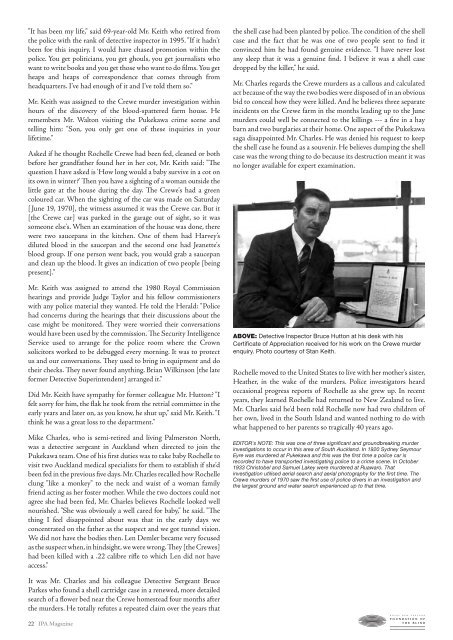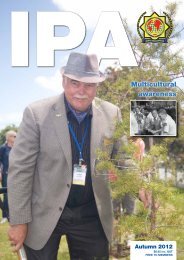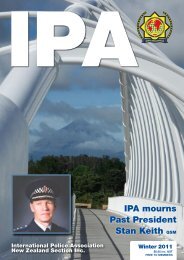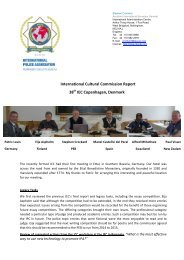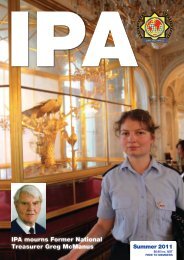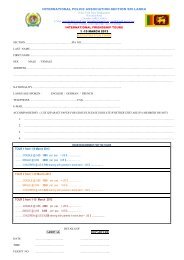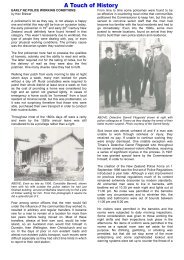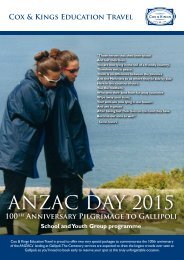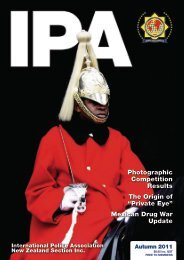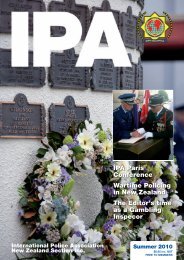The Crewe Murders - Ipa.org.nz
The Crewe Murders - Ipa.org.nz
The Crewe Murders - Ipa.org.nz
You also want an ePaper? Increase the reach of your titles
YUMPU automatically turns print PDFs into web optimized ePapers that Google loves.
"It has been my life," said 69-year-old Mr. Keith who retired from<br />
the police with the rank of detective inspector in 1995. "If it hadn't<br />
been for this inquiry, I would have chased promotion within the<br />
police. You get politicians, you get ghouls, you get journalists who<br />
want to write books and you get those who want to do films. You get<br />
heaps and heaps of correspondence that comes through from<br />
headquarters. I've had enough of it and I've told them so."<br />
Mr. Keith was assigned to the <strong>Crewe</strong> murder investigation within<br />
hours of the discovery of the blood-spattered farm house. He<br />
remembers Mr. Walton visiting the Pukekawa crime scene and<br />
telling him: "Son, you only get one of these inquiries in your<br />
lifetime."<br />
Asked if he thought Rochelle <strong>Crewe</strong> had been fed, cleaned or both<br />
before her grandfather found her in her cot, Mr. Keith said: "<strong>The</strong><br />
question I have asked is 'How long would a baby survive in a cot on<br />
its own in winter?' <strong>The</strong>n you have a sighting of a woman outside the<br />
little gate at the house during the day. <strong>The</strong> <strong>Crewe</strong>'s had a green<br />
coloured car. When the sighting of the car was made on Saturday<br />
[ June 19, 1970], the witness assumed it was the <strong>Crewe</strong> car. But it<br />
[the <strong>Crewe</strong> car] was parked in the garage out of sight, so it was<br />
someone else's. When an examination of the house was done, there<br />
were two saucepans in the kitchen. One of them had Harvey’s<br />
diluted blood in the saucepan and the second one had Jeanette's<br />
blood group. If one person went back, you would grab a saucepan<br />
and clean up the blood. It gives an indication of two people [being<br />
present]."<br />
Mr. Keith was assigned to attend the 1980 Royal Commission<br />
hearings and provide Judge Taylor and his fellow commissioners<br />
with any police material they wanted. He told the Herald: "Police<br />
had concerns during the hearings that their discussions about the<br />
case might be monitored. <strong>The</strong>y were worried their conversations<br />
would have been used by the commission. <strong>The</strong> Security Intelligence<br />
Service used to arrange for the police room where the Crown<br />
solicitors worked to be debugged every morning. It was to protect<br />
us and our conversations. <strong>The</strong>y used to bring in equipment and do<br />
their checks. <strong>The</strong>y never found anything. Brian Wilkinson [the late<br />
former Detective Superintendent] arranged it."<br />
Did Mr. Keith have sympathy for former colleague Mr. Hutton? "I<br />
felt sorry for him, the flak he took from the retrial committee in the<br />
early years and later on, as you know, he shut up," said Mr. Keith. "I<br />
think he was a great loss to the department."<br />
Mike Charles, who is semi-retired and living Palmerston North,<br />
was a detective sergeant in Auckland when directed to join the<br />
Pukekawa team. One of his first duties was to take baby Rochelle to<br />
visit two Auckland medical specialists for them to establish if she'd<br />
been fed in the previous five days. Mr. Charles recalled how Rochelle<br />
clung "like a monkey" to the neck and waist of a woman family<br />
friend acting as her foster mother. While the two doctors could not<br />
agree she had been fed, Mr. Charles believes Rochelle looked well<br />
nourished. "She was obviously a well cared for baby," he said. "<strong>The</strong><br />
thing I feel disappointed about was that in the early days we<br />
concentrated on the father as the suspect and we got tunnel vision.<br />
We did not have the bodies then. Len Demler became very focused<br />
as the suspect when, in hindsight, we were wrong. <strong>The</strong>y [the <strong>Crewe</strong>s]<br />
had been killed with a .22 calibre rifle to which Len did not have<br />
access."<br />
It was Mr. Charles and his colleague Detective Sergeant Bruce<br />
Parkes who found a shell cartridge case in a renewed, more detailed<br />
search of a flower bed near the <strong>Crewe</strong> homestead four months after<br />
the murders. He totally refutes a repeated claim over the years that<br />
22 IPA Magazine<br />
the shell case had been planted by police. <strong>The</strong> condition of the shell<br />
case and the fact that he was one of two people sent to find it<br />
convinced him he had found genuine evidence. "I have never lost<br />
any sleep that it was a genuine find. I believe it was a shell case<br />
dropped by the killer," he said.<br />
Mr. Charles regards the <strong>Crewe</strong> murders as a callous and calculated<br />
act because of the way the two bodies were disposed of in an obvious<br />
bid to conceal how they were killed. And he believes three separate<br />
incidents on the <strong>Crewe</strong> farm in the months leading up to the June<br />
murders could well be connected to the killings --- a fire in a hay<br />
barn and two burglaries at their home. One aspect of the Pukekawa<br />
saga disappointed Mr. Charles. He was denied his request to keep<br />
the shell case he found as a souvenir. He believes dumping the shell<br />
case was the wrong thing to do because its destruction meant it was<br />
no longer available for expert examination.<br />
ABOVE: Detective Inspector Bruce Hutton at his desk with his<br />
Certificate of Appreciation received for his work on the <strong>Crewe</strong> murder<br />
enquiry. Photo courtesy of Stan Keith.<br />
Rochelle moved to the United States to live with her mother's sister,<br />
Heather, in the wake of the murders. Police investigators heard<br />
occasional progress reports of Rochelle as she grew up. In recent<br />
years, they learned Rochelle had returned to New Zealand to live.<br />
Mr. Charles said he'd been told Rochelle now had two children of<br />
her own, lived in the South Island and wanted nothing to do with<br />
what happened to her parents so tragically 40 years ago.<br />
EDITOR's NOTE: This was one of three significant and groundbreaking murder<br />
investigations to occur in this area of South Auckland. In 1920 Sydney Seymour<br />
Eyre was murdered at Pukekawa and this was the first time a police car is<br />
recorded to have transported investigating police to a crime scene. In October<br />
1933 Christobel and Samuel Lakey were murdered at Ruawaro. That<br />
investigation utilised aerial search and aerial photography for the first time. <strong>The</strong><br />
<strong>Crewe</strong> murders of 1970 saw the first use of police divers in an investigation and<br />
the largest ground and water search experienced up to that time.


